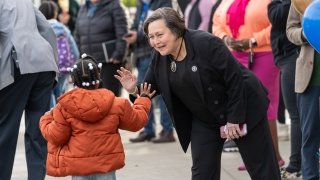Elizabeth Blanco EdD ’09 has worked in education for over 37 years. She has seen and been through a lot during her career, but nothing compares to her experience leading the Pasadena Unified School District (PUSD) through the historic wildfires that swept through the Los Angeles area in January 2025.
Schools in the Pasadena district reopened their doors to students after winter break on Jan. 6, but the next day, the Eaton fire began, quickly igniting dry hillsides fueled by strong Santa Ana winds. Though schools closed on Jan. 8, Superintendent Blanco and her leadership team were hard at work.
But where does a leader begin to address the problems caused by a historic fire event for which there is no tried-and-true playbook?
To start, Blanco activated the district’s Emergency Operations Center, which had undergone a dry run in August 2023 when a tropical storm prompted the district to close schools. Blanco knew immediately that the team’s number one priority was to reopen schools as soon as it was safe to do so. “We know that school is a sense of normalcy and the bedrock of democracy,” she says.
This goal and the district’s five core values—cultural competency, equity, accountability, collaboration and fiscal responsibility—guided the seven-member leadership team as they grappled with responding to the deadly fire. Of the 14,000 students enrolled in PUSD, 10,000 lived in evacuation zones or in burn areas. Many of the district’s schools were damaged, and five were destroyed in the flames.
While the fire burned for 24 days and was fully contained by Jan. 31, schools reopened in phases from Jan. 23 to 30. It wasn’t an easy task and required an incredible amount of collaboration and extraordinary leadership.
Blanco identified early on that it was essential to make sure her staff had access to housing. Many were evacuated during the fires, and nearly 1,000 students and 140 staff lost their homes. But to get schools up and running, teachers, administrators and other staff members needed a place to call home, even temporarily.
To the many leaders who reached out to see how they could support PUSD, from Gov. Gavin Newsom to State Superintendent of Public Instruction Tony Thurmond, Blanco stressed that they needed to provide housing for staff. They quickly entered into an agreement with Airbnb to provide free vouchers to those affected by the fires. “Emergency housing was very important,” Blanco explains. “Hotels were full, and teachers couldn’t afford to pay for [temporary housing] for more than a couple of weeks.”
With a place for displaced PUSD employees to live, Blanco and her team were ready to tackle other challenges. The list of to-dos was endless and included buying new materials, from books to furniture; finding new locations for schools that were badly damaged or destroyed; and deep cleaning the schools that were still standing. The cleaning of one high school that wasn’t even close to the flames took seven days and nights, as the powerful winds had blown ash and soot in through the closed windows. As the district tackled these tasks and others, Blanco also oversaw her team’s coordination with numerous government agencies, including the cities of Pasadena and Sierra Madre and the town of Altadena, which is governed by Los Angeles County.
Just days after the fire destroyed Eliot Arts Magnet School, the school board passed a resolution to rebuild the historic landmark and keep its tight-knit community intact. “We wanted to give the community hope,” Blanco says. The school stood in the center of Altadena and was a cornerstone of the community, Blanco explains. The loss of the school was deeply felt, and many residents came to the building's demolition carrying lit candles.
While the district makes plans to rebuild the school, Eliot Arts Magnet students have been relocated to McKinley School. The merger “hasn’t been all roses,” Blanco says, as there have been challenges with sharing space, but it was important to keep the Eliot Arts community together.
There were certainly moments when Blanco didn’t feel strong, but she kept going. “Students and the employees needed to see that,” she says. The leadership team also faced their own personal struggles, and some needed to step out to deal with those obstacles. But all the while, they stayed “small but mighty,” Blanco says. “They were an army that kept me going.”
Blanco also leaned on support from other superintendents. A long-standing group chat that includes other area district leaders, many of whom are also Trojans, was a source of comfort. “It’s an isolating role to begin with,” Blanco says, but having the ability to share experiences and work through problems with other superintendents was very helpful.
Before Blanco assumed the role of PUSD superintendent in 2024, the previous superintendent shared some advice through the adage “Heavy is the head that wears the crown.” During PUSD’s fire response, this rang even more true. The role demanded that Blanco be not only the district’s instructional leader but also the emergency response chief, a grief counselor and a community steward, among many other roles. The superintendency, during a time of crisis, requires “heart, humility and the ability to lead when you are hurting. It’s not about perfection but about response and being there for others,” Blanco says.
Blanco credits her mentors at USC—professors Maria Ott, Rudy Castruita and Darline Robles—as being key to her success as a superintendent. There have been many times during her leadership when she has put the strategies she learned at the USC Rossier School of Education into action.
Ott, the Irving R. and Virginia Archer Melbo Chair in Educational Administration, has stayed in touch with Blanco over the years, tracking her career closely and offering an ear when needed. “Dr. Blanco’s selfless response models the best in Trojan leadership,” Ott says. “I am proud of her for keeping the focus on students and their future while working with her team and community to rebuild and move forward.”
While wildfires are a part of the California ecosystem—some native seeds, in fact, germinate only after a fire—the occurrence of megafires like the Palisades and Eaton fires of January 2025 has grown due to climate change, faulty infrastructure and the reluctance to conduct controlled burns. “This is not the end of wildfires,” Blanco says, adding that district leaders must “prepare now.” Having an emergency plan in place is essential, along with strategies to help the most vulnerable students, Blanco explains. A solid communication plan is also key; during the Eaton fire, the district sent messages to the community two or three times a day and has since been widely praised for the strategy.
Also important, Blanco says, is addressing needs after tragedy strikes. The district has hired a crisis counselor and several multitiered systems of support coordinators to help address the mental health needs of the community. “The trauma was very bad and still is,” Blanco says. These new hires aim to help the district execute a long-term goal of supporting those affected by the fires.
Through the unimaginable tragedy of the L.A. fires, the resilience of the students of PUSD shone through. Just weeks after the fires, students at Eliot Arts Magnet put on a performance of Shrek Jr. Another student group, the PUSD Student Think Tank, planned and executed a robust conference at the Sheraton Hotel. Seeing these students thriving and refusing to be defined by the tragedy of the Eaton fire was incredible for Blanco and the rest of PUSD. “The students were the ones who helped us keep going,” Blanco says.







